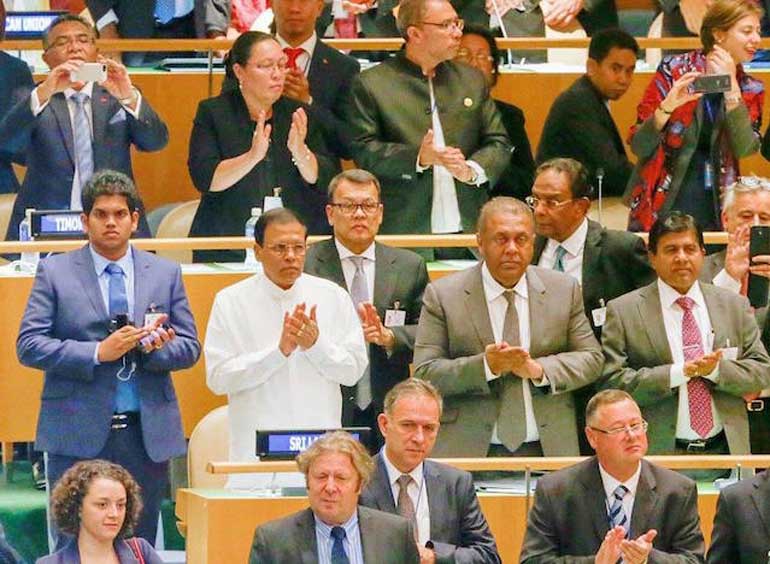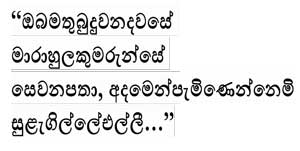Friday Feb 13, 2026
Friday Feb 13, 2026
Thursday, 1 October 2015 00:00 - - {{hitsCtrl.values.hits}}
 President Maithripala Sirisena and his son Daham Sirisena at the 70th Session of the United Nations General Assembly at the UN Headquarters in New York
President Maithripala Sirisena and his son Daham Sirisena at the 70th Session of the United Nations General Assembly at the UN Headquarters in New York
Initially this writer could not comprehend the furore over young Daham Sirisena accompanying his father to New York. It was possible that his official role was that of a ‘private secretary’ who also happened to be the son of the President. To all appearances it was much ado about nothing.
Daham Sirisena expressed his anguish at what he felt to be unjust or unwarranted criticism with the plaintive words: “My dear friends, what is nepotism?” This query in cyberspace opened up a new debate and a Pandora’s Box.
The occasional opening of a Pandora’s Box is not without its merits. The mythical Pandora’s Box when opened released misery and sadness but left hope behind. We too can find some hope in this public discourse on nepotism. It is very unlikely that his response was purely his own. Image engineers can be quite counterproductive. The debate is far more serious. It is a feud between sovereignty of hypocrisy and universalism of modernity.
What is nepotism?
What is nepotism? The word nepotism derives from the Italian word ‘nepote’ which means nephew. In days past, the illegitimate progeny of Popes were explained away as “nephews”. They often received paternal patronage. This practice of papal preferential treatment added the term ‘nepotism’ to the lexicon.
Ours is not a rule-based culture. Ours is a relationship-based culture. How else can you explain the hierarchical succession of our Mahanayakes who through generations happen to belong to a tiny cluster of villages in the Matale District? The sacerdotal succession in the Siyamnikaya is testimony to institutionalised nepotism in the Sinhala Buddhist ethos. The accepted tradition of well-endowed temples was to ordain a nephew to perpetuate succession. Today the ceremony is covered on live television.
The Angarika Dharmapala Trust consisting mostly of grandnephews of the revered Angarika – the ‘homeless ascetic’ – is currently engaged with the Mahabodhi Society in the District Court of Colombo over the title to its temple property in the proposed Megapolis! That is nepotism of the ‘Buddhist Hamu’ class.
Yet we live in interesting times. There is great disorder under the heavens and the purebred resist the hybrid with much muscle.
Good governance
This is the time for us to resolve the dichotomies of our public morals by situating the conversation on good governance, nepotism, corruption, cronyism and human rights in the universalist frame.
To begin with, good governance is not home grown in the Mahavamsa land. This is our problem in Geneva as well. The imperialist and decadent West presumes that society should function in a universalist manner. Political behaviour according to these neo colonial regime manipulators and Western theorists should be regulated by laws that apply to everyone. Now that is precisely the grievance of Gunadasa Amarasekera and Wimal Weerawansa against poor Rajavarothiam Sampanthan.
The calibration of the capacity of the State to ensure good governance measured against universal benchmarks is a very late 20th and early 21st century phenomenon. The sobriquet ‘Uncle Nephew Party’ was not resented by the then UNP. Even today Punchi Premadasa is in reluctant cohabitation with JR’s nephew. Comrade Tissa Vitarana’s nephew of a Trotsky adherent claims titular succession in the LSSP. Had Feroza Muzzamil succeeded in her bid, UNP General Secretary Kabir Hashim woud have had his sister-in-law in Parliament.
The father and son combinations, husband and wife teams and sons and daughter trekking the paths of glory in family tradition makes our Parliament a hybrid of representative democracy and incestuous feudal archaism.
We condemn nepotism but are reconciled to its practice. The reason for our collective tolerance of nepotism, corruption and human rights abuse is because we are not ready for corrective action. Instead we rationalise our ambiguity on grounds that it makes little sense to be “the only one” who has read or heard of Immanuel Kant.
Corruption, nepotism, irrational chauvinism are all forms of behaviour. These patterns of behaviour cannot be singled out and defined unless we contextualise how the particular society functions. The advanced democracies are mainly to be found in the West. The Western cultures evolved through the ages of renaissance, enlightenment and discovery are rule based. The people in those cultures trust the system.
Politics based on personal relationships
We in our system trust our family first, friends next and others perhaps. Our politics are based on personal relationships. That was demonstrated when seven election rejects were appointed to Parliament and rewarded with ministerial office. It was a classic demonstration of organising governance based on personal relationships and mutual obligation. How can loyalty to cronies be sanctioned and filial or familial loyalty be condemned?
Universal ethical norms are based on the behavioural expectations of the rational individual from which individual responsibility, dignity and individual human rights are derived. The Sinhala Buddhist world view refuses to acknowledge human beings as individuals but as a single overarching consciousness and a connectedness that is tribal.
The classical Buddhist doctrinal position on free inquiry is contained in the ‘Kalama Sutta’. It is where the Buddha exhorts the Brahamin Kalama: “Do not go upon what has been acquired by repeated hearing; nor upon tradition; nor upon rumour; nor upon what is in a scripture; nor upon surmise; nor upon an axiom; nor upon specious reasoning; nor upon a bias towards a notion that has been pondered over; nor upon another’s seeming ability; nor upon the consideration, ‘the monk is our teacher’. When you yourself know: These things are bad; these things are blamable; these things are censured by the wise; undertaken and observed, these things lead to harm and ill, abandon them.” Free inquiry is the one Buddhist ideal that has been utterly distorted in Sri Lanka.
Difficult to detect when fish drinks water
Daham Sirisena accompanying his father is no big deal. That he was allowed to speak for the younger generation of his country at an international event too should not be held against him. Obviously the President would have been advised that his son could play a constructive role in New York. President Sirisena should heed Kautilya who warned his King how difficult it was to detect when exactly the fish drank water. Or do the fish drink water?
Nepotism is considered wrong in some cultures. It is perhaps virtuous in ours. The lyrics of this hauntingly melodious Sinhala song by Victor Rathnayake encapsulates the distance we need to trek. Poignantly tender sentiments. Yet they turn Prince Siddhartha’s purpose of renunciation upside down.
